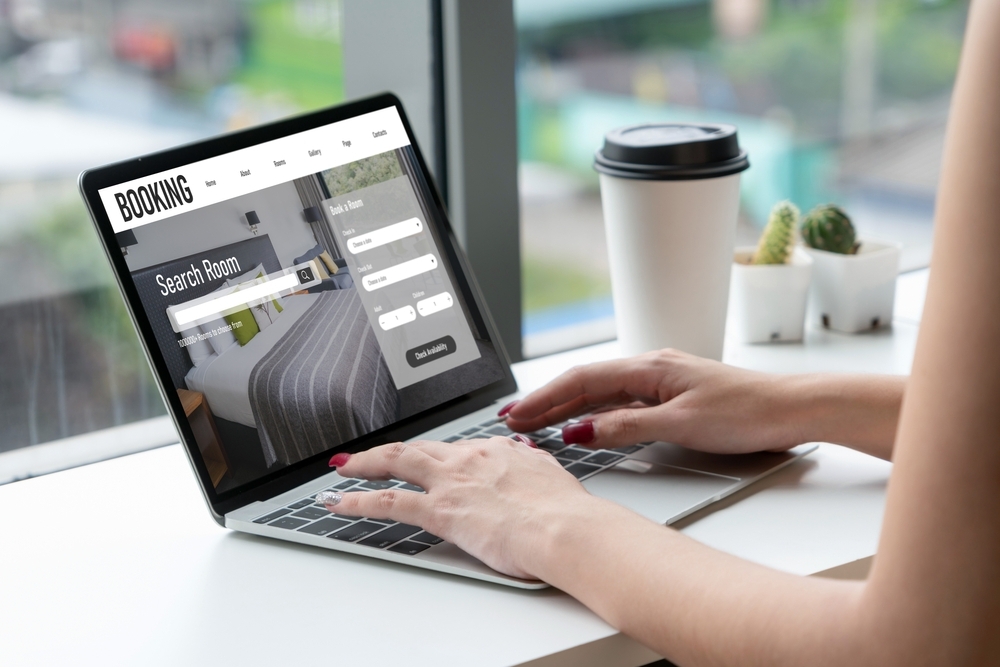How Hotel Reservation System Works & Its Top Features
By Nikita Nielsen · 23. April 2024
What exactly happens behind the scenes when you click ‘book now’ on a hotel’s website?
This article goes straight into how hotel reservation systems work, with a clear breakdown of their role in managing bookings, adjusting room rates, and updating room availability.
Read more about the features, benefits, and operational ins and outs of these systems that keep the hospitality industry ticking around the clock.
Key Takeaways
- Hotel reservation systems have revolutionised efficiency with instant updates, secure payment processing, and a careful approach to avoid errors.
- Modern reservation systems effortlessly manage room inventory, adjust pricing dynamically in response to market demand, eliminate overbooking entirely.
- Enhancing the guest experience is the highlight of the hotel’s digital offerings. Reservation software now delivers personalised service faster than ever.
Demystifying Hotel Reservation Systems
 online hotel accommodation booking website
online hotel accommodation booking website
Hotel reservations are no longer processed manually, with room availability scribbled on giant ledgers and rates calculated with a calculator.
The advent of hotel reservation systems has paved the way for a more efficient and error-free approach to managing hotel operations.
These systems automate the booking process, manage real-time payments, guest details, room availability, and overall hotel operations, adding a layer of sophistication while minimising the risk of human error.
Some key benefits of using a hotel reservation system include:
- Streamlined booking process
- Real-time availability updates
- Secure payment processing
- Centralised guest information management
- Automated email notifications
- Integration with other hotel management tools
By implementing a hotel reservation system, hotels can streamline operations, enhance the guest experience, and ultimately boost revenue.
To achieve these benefits, it’s important to understand how a hotel reservation system works.
Hotel reservation📅🗝️ systems keep track of room inventory and rates, providing prospective guests with quick access to crucial information such as room rates and availability for specific dates.
Upon guests reserving their stay, the system allows them to finalise their booking through an online payment portal, after which it updates the property management system (PMS) and reservation websites through a channel manager.
This way, the entire booking process is streamlined, simplifying tasks for both hotel staff and guests.
Understanding Room Inventory Control
Managing room inventory is an important aspect of running a hotel. If not handled properly, it can lead to overbookings or empty rooms, both of which negatively impact revenue.
That’s where a hotel reservation system steps in to save the day.
By tracking room availability and preventing double bookings, these systems guarantee that your guests always have a room waiting for them when they arrive.
What’s the process behind monitoring room availability with these systems? A key element known as the channel manager plays a big role.
It updates room availability across various distribution channels, such as online travel agencies (OTAs) and metasearch engines, in real-time.
Additionally, a central reservation system (CRS) manages reservations across different properties, preventing double bookings and supporting resource allocation and marketing strategies.
The outcome? Precise, up-to-date information on room availability and rates, avoiding errors like overbooking.
Navigating Rates and Pricing Management
In the hospitality industry, static pricing just won’t cut it. Market demand, competition, and seasonal variations all play a part in determining the optimal room rate.
Hotel reservation systems implement dynamic pricing strategies to respond to these factors, ensuring competitive rates throughout the year.
So, how is this accomplished by these systems? By automatically adjusting room rates based on seasonal variations.
This means that during high-demand periods, rates can be raised to maximise revenue, while during low-demand periods, rates can be reduced to attract guests.
This dynamic approach ensures that hotels remain competitive throughout different times of the year. In other words, it’s a win-win situation for both hotels and guests.
Reservation Processing in Action
Picture this: You’ve just made a reservation at your favourite hotel. After finalising your booking through the online payment portal, the hotel reservation system begins its magic.
As soon as the transaction is completed, the property management system (PMS) is updated with the new booking details. This means that the hotel is instantly aware of your reservation and can start preparing for your arrival.
And how does the system handle these listings on booking websites? The channel manager helps update property listings on these websites, reflecting the latest booking and availability status.
This way, the system guarantees real-time updates across all channels, avoiding overbooking situations and ensuring a smooth reservation process for all future guests.
The Core Elements of a Hotel Reservation System
 hotel receptionist giving guest key card
hotel receptionist giving guest key card
Now that we’ve looked into how hotel reservation systems function, let’s dive into their core components.
A good hotel reservation system often includes a front desk system, a booking engine, and a channel manager.
These elements team up to streamline hotel operations, making them smoother and making guests’ experiences better.
The main parts of a hotel technology stack include:
- Booking engine: Makes it easy to book directly through the hotel’s website and can be integrated with existing hotel management systems for smooth operation.
- Channel manager: Ensures accurate communication of booking data, keeping room availability updated across all distribution channels.
- Property management system (PMS): This main component of the hotel technology stack will be discussed in the upcoming section.
These components work together to streamline hotel operations and enhance the guest experience.
Booking Engine: Facilitating Direct Reservations
 hotel booking app
hotel booking app
The booking engine is the core of any hotel reservation system. By allowing guests to check availability and directly book their stays through the hotel’s website, it simplifies the booking process and potentially increases commission-free direct bookings.
But that’s not the only advantage. By providing support for multiple currencies, the booking engine accommodates international guests, allowing them to pay in their preferred currency.
Modern central reservation systems enable guests to browse rates directly on the hotel’s website before entering the booking engine, contributing to an enhanced researching and booking process.
Simply put, a well-integrated booking engine not only simplifies the booking process but also enhances the guest experience, leading to increased guest loyalty and positive feedback.
Channel Manager: Synchronising with Distribution Channels
A channel manager ensures that all distribution channels are in harmony by controlling and distributing hotel inventories across different channels such as:
- Global distribution systems (GDSs)
- Online travel agencies (OTAs)
- Wholesalers
- Direct booking platforms
It ensures that room availability and rates are updated across all platforms.
The role of the channel manager includes:
- Maintaining harmony between different channels
- Enhancing a hotel’s online presence
- Connecting with major OTAs to attract a larger pool of travellers
- Maximising occupancy and revenue
In summary, an effective channel manager is essential for ensuring that your hotel reaches the right audience at the right time.
Property Management System Integration
Have you ever wondered how front desk operations, administrative tasks, and housekeeping management are so efficiently handled at hotels? The secret lies in the integration of the hotel reservation system with the property management system (PMS).
This integration creates a cohesive ecosystem, linking the booking engine, PMS, and other management software, ultimately enhancing the overall efficiency.
When booking details are captured by the reservation system, they are relayed to the PMS, ensuring accurate management of room availability and front desk operations such as guest check-in and check-out.
However, integrating reservation platforms with existing business systems isn’t without its challenges. Addressing these challenges is important for maintaining operational consistency and guest satisfaction.
Enhancing Guest Experience with Reservation Software
The ultimate aim of any hotel operation is to provide guests with an unforgettable experience. That’s where reservation software comes into play.
By treating the CRS, booking engines, and hotel websites as a singular e-commerce entity, reservation software can offer personalised services and simplify the online booking journey.
By offering personalised greetings, handling special requests, and providing tailored experiences, the software improves the guest experience.
What’s more, an integrated booking engine strengthens guest loyalty by managing the booking process easily and offering flexibility with changes and cancellations.
In other words, hotel reservation software is leading the charge towards a new era of personalised, hassle-free hotel experiences via online reservations.
Personalization and Guest Preferences
 a happy hotel guest
a happy hotel guest
Everyone likes to feel special, and hotel guests are no different. Advanced reservation systems include features such as CRM functionality, enabling personalised guest experiences and targeted marketing campaigns.
Based on a guest’s past preferences, these systems can offer customised services and recommendations, such as preferred room views or specific amenities.
However, personalization isn’t just about the booking process. Throughout the guest’s stay, personalised communication, including check-ins and service recommendations, improves the overall experience.
By catering to guest preferences, reservation systems are changing the guest experience from generic to personalised, resulting in enhanced guest loyalty.
Simplifying the Online Booking Journey
Hotel reservation systems prioritise a user-friendly interface to facilitate quick and efficient online bookings.
By offering a smooth user experience, these systems can increase customer satisfaction and encourage direct bookings.
Design is key in this aspect. The design of a booking engine’s interface can prevent unfinished bookings and enhance the guest experience.
Additionally, showcasing customer reviews and feedback on the hotel’s reservation system can reinforce the establishment’s reputation and motivate guests to complete their bookings.
An easy and hassle-free online booking journey is key to attracting and retaining customers in the digital age.
Optimizing Hotel Operations with Reservation Management
 hotel receptionist checking in guests
hotel receptionist checking in guests
While guest experience is crucial, it’s equally important to ensure smooth hotel operations. That’s where reservation management comes in.
By centralising all reservations, these systems allow for efficient management of bookings, minimising errors, and enhancing operational efficiency.
Additionally, reservation systems offer the following advantages:
- Securely process online payments
- Protect against potential fraud through strong encryption and authentication measures
- Provide peace of mind for both the hotel and its guests when it comes to payment transactions.
Streamlining Administrative Workloads
Running a hotel involves a multitude of administrative tasks that can be time-consuming and prone to errors if managed manually.
Thankfully, hotel reservation systems automate key tasks, reducing the time spent on administrative duties and enhancing operational efficiency.
By automating tasks like availability management, reservation confirmations, and guest communication, these systems minimise human errors and ensure more accurate data.
Plus, real-time system updates facilitated by automation help hotel staff manage changes efficiently, keeping pace with the dynamic hotel industry.
Revenue Management System Insights
Revenue management is essential for running a profitable hotel. By using data analytics to predict demand and adjust room rates dynamically, revenue management systems can maximise Revenue Per Available Room (RevPAR).
These systems consider factors such as:
- seasonal trends
- local events
- competitor pricing
- historical data
to optimise hotel pricing.
Additionally, analytics and reporting tools offer insights into booking patterns and revenue metrics, which support strategic business decisions.
The Evolution of Reservation Systems in the Hotel Industry
The hotel industry has come a long way since the era of pencil and paper reservation systems. The evolution of these systems has led to the rise of:
- Brand websites
- Online travel agencies (OTAs)
- Metasearch sites
- Applications for last-minute bookings
As a result, hotels have gained access to more distribution channels and increased market exposure, enhancing efficiency and productivity within the hospitality industry.
Today, hotels that integrate effective payment gateways into their reservation systems show their commitment to keeping up with technology.
Despite the constant pressure to adapt and provide a high-quality service experience due to market competition, reservation systems have proven to be a game-changer in the hospitality industry.
Summary
Hotel reservation systems have become essential tools in the hospitality industry. By streamlining operations, automating administrative tasks, personalising the guest experience, and optimizing revenue, these systems have revolutionised hotel operations.
As technology continues to evolve, so will these systems, continuously improving efficiency and guest satisfaction in the hospitality sector.
Frequently Asked Questions
What is a hotel reservation system?
A hotel reservation system is a software that simplifies booking, payment handling, guest info management, and overall hotel tasks.
How does a hotel reservation system work?
A hotel reservation system works by centralising room inventory and rates, enabling guests to check availability, view rates, and book directly. After a booking, the system updates the property management and reservation websites.
What are the main components of a hotel reservation system?
The core components of a hotel reservation system are a front desk system, a booking engine, and a channel manager.
How can a hotel reservation system enhance the guest experience?
By offering personalised services, simplifying online booking, and ensuring secure payments, a hotel reservation system can significantly enhance the guest experience.
How has the evolution of reservation systems impacted the hotel industry?
The evolution of reservation systems has transformed the hotel industry by expanding distribution channels, streamlining operations, and boosting guest satisfaction.

